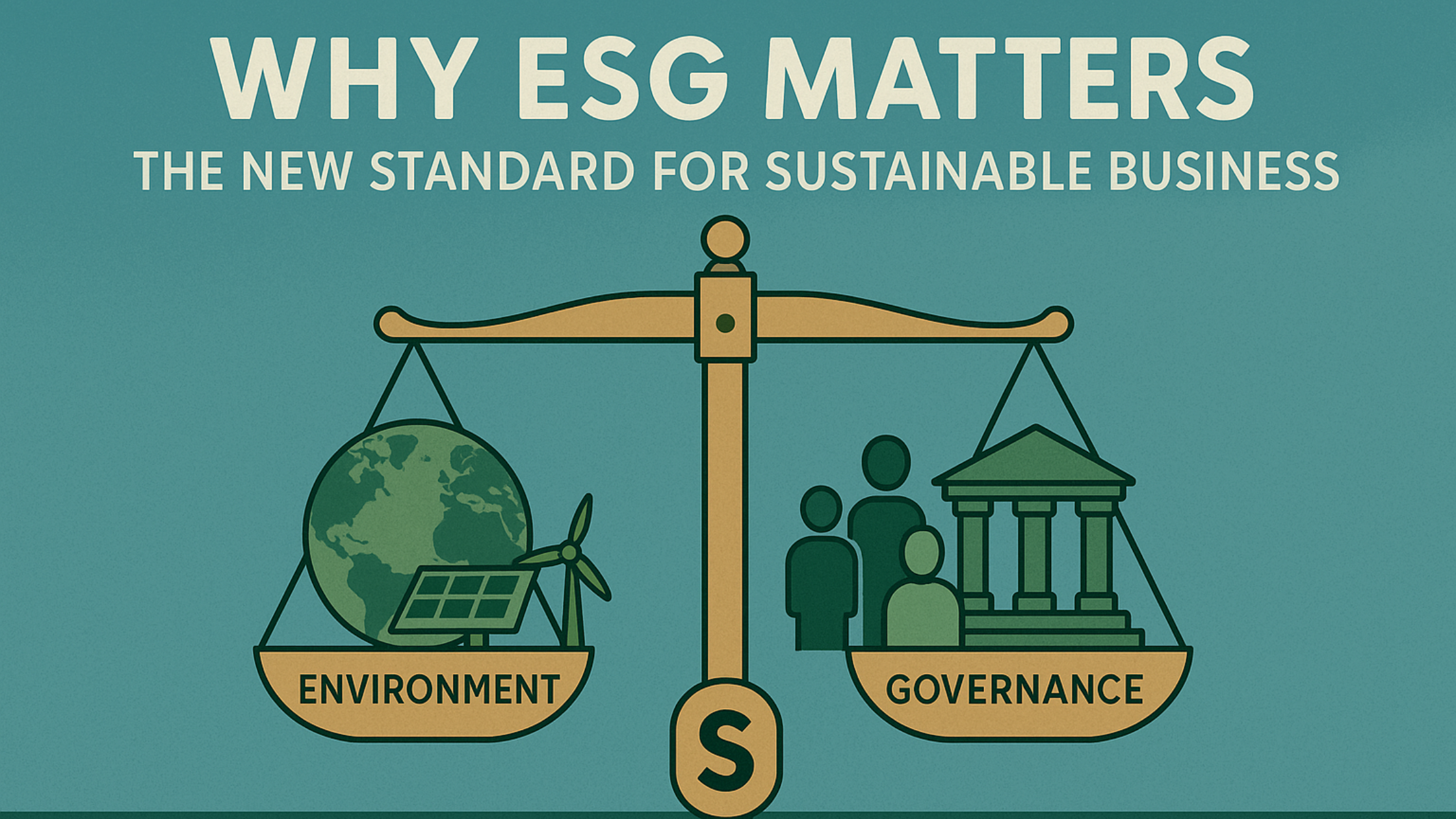In today’s corporate world, environmental, social, and governance (ESG) is more than simply a fad; it is a basic measure of success and responsibility over the long term.
An evaluation of a company’s long-term business practices, ethical effect, and sustainability may be accomplished via the use of a framework known as ESG, which stands for environmental, social, and governance. In this way, investors, stakeholders, and consumers are better able to comprehend the manner in which firms handle risks and opportunities that are associated with environmental, social, and governance characteristics. Companies that have an emphasis on environmental, social, and governance issues are seen as being more responsible, trustworthy, and prepared for the future.
ESG in the UAE: A Regional Momentum
In the Middle East the UAE is the most advanced in ESG development. With national strategies such as:
- UAE Strategic Initiative: Net Zero 2050.
- Dubai Clean Energy Strategy 2050.
- National Framework for Sustainable Finance.
- UAE Green Agenda 2030.
More frameworks are being put in place to promote responsible business. Regulators, financial institutions, and even investors are incorporating ESG criteria into their financing and compliance procedures.
All of these developments provide new pressures and possibilities for UAE-based enterprises to increase their efforts to fulfill global ESG rules.
The Smart Path Forward with EcoSmart
At Ecosmart, we provide individualized environmental, social, and governance (ESG) services to assist your company in navigating the difficulties of sustainability, enhancing the trust of stakeholders, and creating value that will endure.
Our Core Offerings Include:
- Greenhouse Gas (GHG) Inventories & Mitigation Planning
Development of baseline emission inventories and strategic roadmaps for decarbonization. - Sustainable Infrastructure & Smart Energy Solutions
Capital planning and deployment of low-carbon, energy-efficient technologies for infrastructure projects. - ESG Governance Design & Disclosure Alignment
Framework development and implementation aligned with global standards (GRI, SASB, SDGs). - Sustainability Performance & Gap Assessments
Comprehensive audits to identify gaps in sustainability practices and recommend actionable improvements. - ESG Capacity Building & Training Programs
Tailored training modules, including ESG awareness, reporting skills, and strategic integration. - Green Building and Energy Efficiency Consulting
End-to-end advisory on sustainable building design, retrofits, and compliance with green certifications. - Carbon Accounting and Integrated ESG Reporting
Quantification of emissions and preparation of ESG reports aligned with international benchmarks. - Policy Advisory & Institutional Readiness Programs
Support for regulatory adaptation and institutional strengthening for climate and ESG governance.
Tailored ESG pathways integrating ambition and feasibility help us serve SMEs and large corporations alike.
How to Start Your ESG Journey
- Identify ESG Factors: Pinpoint the critical Environmental, Social, and Governance risks and opportunities impacting your organization and compare your standing with competitors.
- Measure Gaps & Set Goals: Quantify your performance against internal targets or best practices to identify areas for improvement and set clear objectives.
- Implement & Innovate: Execute your plan by implementing changes, adopting new technologies, and utilizing sustainable methods.
- Monitor & Analyze: Track progress towards your goals, measure the impact of your actions, and analyze the results.
- Report & Refine: Communicate your performance and findings, then use the insights gained to review effectiveness and adapt your strategy for the next cycle.
Conclusion
Traditionally, profit and ESG were seen as opposing objectives. However, integrating ESG principles into business operations is now recognized as a strategic path to resource optimization and long-term value creation. By aligning with ESG frameworks, organizations can drive both social responsibility and financial performance.
Businesses that proactively adopt ESG strategies today are positioning themselves for future success — achieving stronger financial outcomes, enhanced reputation, and improved operational efficiency.
What is ESG and why is it important for businesses today?
ESG stands for Environmental, Social, and Governance. It’s a framework that evaluates a company’s sustainability, ethical impact, and long-term risk management. Embracing ESG not only builds trust with investors and stakeholders but also positions businesses for long-term success.
How is the UAE advancing in ESG practices?
The UAE is a regional leader in ESG development, driven by initiatives like the Net Zero 2050 Strategy, Dubai Clean Energy Strategy 2050, and the UAE Green Agenda 2030. These frameworks are reshaping regulatory, financial, and investment landscapes to prioritize responsible business practices.
How can EcoSmart help my company with ESG?
EcoSmart offers tailored ESG services including GHG inventory and mitigation planning, sustainable infrastructure consulting, ESG governance design, integrated ESG reporting, and more — all designed to strengthen your sustainability efforts and stakeholder confidence.
What is the first step to starting our ESG journey?
Begin by identifying key ESG factors relevant to your business. This includes understanding your environmental impact, social responsibilities, and governance practices, followed by assessing performance gaps and setting improvement goals.
Can ESG really improve financial performance?
Yes. Companies that integrate ESG strategies often see enhanced operational efficiency, reduced risks, better stakeholder engagement, and stronger brand value — all contributing to improved long-term financial outcomes.

